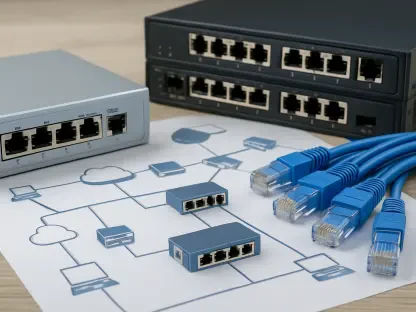In a digital era where cyber threats loom larger than ever, Okta’s recent $75 million acquisition of Axiom Security marks a significant milestone in the cybersecurity landscape, reflecting a calculated step toward redefining the principles of zero-trust security. This strategic maneuver is not just a financial transaction but a deliberate effort to establish a model that operates on the premise that no user or device can be inherently trusted and must undergo continuous verification. With the proliferation of remote work, the complexity of multi-cloud environments, and an alarming rise in sophisticated attacks like ransomware, the demand for robust security frameworks has skyrocketed. Okta, already a dominant player in Identity and Access Management (IAM), is leveraging this acquisition to cement its leadership in a market increasingly driven by the need for airtight, identity-focused protection. This move signals a broader shift in how enterprises approach safeguarding their digital assets, setting the stage for a deeper exploration of its implications.
The Rising Tide of Zero-Trust Security
The urgency for zero-trust security frameworks has reached unprecedented levels as businesses grapple with evolving digital challenges. Currently valued at $42.91 billion, the zero-trust market is projected to surge to $92.42 billion by 2030, reflecting a robust annual growth rate of 16.6%. This rapid expansion is fueled by several critical factors: the widespread adoption of remote work, the increasing sophistication of cyber threats, and stringent regulatory mandates like GDPR and CCPA. Traditional perimeter-based defenses, once considered adequate, now fall short in protecting distributed workforces and complex cloud setups. Okta’s acquisition of Axiom Security is a direct response to this pressing need, aiming to deliver scalable and intuitive solutions that align with the zero-trust philosophy of constant verification and minimal access privileges. By integrating Axiom’s capabilities, Okta seeks to address the gaps left by outdated models, positioning itself as a key player in this transformative space.
Beyond market growth, the acquisition underscores a fundamental pivot in cybersecurity strategy driven by real-world demands. Enterprises today face an environment where endpoints are scattered across diverse locations, making the old castle-and-moat approach obsolete. Zero-trust principles, which prioritize continuous monitoring and strict access controls, have emerged as the gold standard for mitigating risks in such scenarios. Okta’s move to acquire Axiom Security enhances its ability to offer comprehensive solutions tailored to these modern imperatives. With cyber incidents costing organizations billions annually, the stakes couldn’t be higher, and Okta’s focus on fortifying its zero-trust offerings through this strategic investment reflects a keen understanding of the critical need for adaptive, forward-thinking security measures that can keep pace with an ever-shifting threat landscape.
Redefining the Security Perimeter with Identity
At the core of the zero-trust paradigm lies a profound shift: identity has become the new security perimeter in a world where physical boundaries no longer suffice. With users accessing systems from varied locations and devices, ensuring secure access through ongoing authentication and least-privilege policies is paramount. Axiom Security’s technology brings to Okta advanced tools such as real-time risk assessment and dynamic policy enforcement, seamlessly enhancing its existing IAM platform. This integration bolsters features like Identity Threat Protection, enabling businesses to protect distributed teams and critical assets with greater accuracy. By prioritizing identity as the focal point of security, Okta addresses the vulnerabilities inherent in dispersed digital environments, ensuring that trust is never assumed but always earned through rigorous verification processes that adapt to emerging risks.
This emphasis on identity-centric security also reflects a broader industry trend toward personalized and context-aware access controls. As cyber attackers increasingly exploit stolen credentials to infiltrate systems, the ability to assess user behavior and device health in real time becomes a game-changer. Axiom’s innovative capabilities, now part of Okta’s arsenal, empower organizations to detect anomalies and adjust access dynamically, minimizing the risk of unauthorized entry. This approach is particularly vital for enterprises managing high-value data across hybrid and multi-cloud setups, where a single breach can have catastrophic consequences. Okta’s strategic enhancement of its platform through this acquisition signals a commitment to not only meeting current security needs but also anticipating future challenges, ensuring that identity remains the bedrock of a resilient zero-trust architecture.
Building a Competitive Advantage Through Ecosystem Synergy
Okta’s acquisition of Axiom Security extends beyond merely acquiring new technology; it represents a deliberate effort to build a cohesive ecosystem that sets it apart in a crowded market. By adhering to open standards such as the Shared Signals Framework and fostering partnerships with industry leaders like Google for mobile and hybrid workforce solutions, Okta creates a unified “trust fabric” for real-time threat response. This interoperability addresses a persistent pain point in cybersecurity: the fragmentation of tools that often leaves gaps in protection. Unlike competitors offering isolated solutions, Okta’s focus on seamless integration through Axiom’s technology ensures that enterprises can deploy comprehensive security measures across diverse environments, reinforcing its position as an innovator in tackling the complexities of modern digital landscapes.
Moreover, this ecosystem-driven approach highlights Okta’s vision of collaborative security in an interconnected world. The ability to integrate with third-party tools and respond to threats dynamically is a critical differentiator, especially for organizations navigating hybrid work models and unmanaged endpoints. Axiom’s contributions, including AI-enhanced threat detection, amplify Okta’s capacity to orchestrate responses across platforms, closing vulnerabilities that siloed systems often overlook. This strategic alignment with broader industry trends toward open frameworks and partnerships demonstrates a nuanced understanding of the need for collective defense mechanisms. By embedding Axiom’s capabilities into its offerings, Okta not only strengthens its competitive edge but also redefines how zero-trust principles can be applied practically to safeguard enterprises against an array of evolving cyber risks.
Financial Implications and Value for Shareholders
From a financial perspective, the $75 million investment in Axiom Security represents a strategic wager with significant potential for returns. While this amount is a modest fraction of Okta’s overall market capitalization, it targets niche expertise and technology that can accelerate its zero-trust roadmap. The primary goal is to drive revenue growth through cross-selling opportunities, enhance customer retention, and increase average contract values by offering more robust security solutions. For shareholders, the transparency of measurable outcomes—such as adoption rates for multi-factor authentication and success in threat detection—provides a clear lens through which to evaluate the impact of this acquisition. This focus on tangible results underscores Okta’s commitment to balancing immediate costs with long-term value creation in a volatile cybersecurity sector.
Additionally, the financial strategy behind this acquisition reveals a broader intent to solidify market confidence in Okta’s growth trajectory. By integrating Axiom’s specialized tools, Okta can cater to the escalating demand for zero-trust solutions, potentially capturing a larger share of a market set to expand dramatically over the coming years. This move also mitigates risks associated with customer churn by offering enhanced security features that meet stringent enterprise needs, thereby fostering loyalty. For investors, the promise of sustained revenue streams through expanded offerings is complemented by the strategic foresight of preempting competitive pressures. The acquisition, though a calculated risk, positions Okta to reap substantial rewards if integration proceeds smoothly, providing a compelling narrative of growth and stability in an industry where innovation often dictates financial success.
Addressing Real-World Cybersecurity Challenges
The acquisition of Axiom Security also showcases Okta’s deep awareness of the practical challenges facing enterprises in today’s cybersecurity environment. Beyond merely upgrading technological capabilities, this move tackles the everyday realities of managing remote teams, securing sprawling cloud infrastructures, and staying ahead of increasingly sophisticated threats. Axiom’s AI-driven threat detection and adaptive access controls introduce a proactive dimension to Okta’s platform, enabling businesses to anticipate risks rather than merely respond to breaches after the fact. This forward-looking stance is crucial for organizations protecting sensitive data in an era where cyber incidents can disrupt operations and erode trust, positioning Okta as a partner capable of navigating the intricacies of modern security demands with precision and foresight.
Furthermore, the practical implications of this acquisition extend to addressing the human and operational elements of cybersecurity. Enterprises often struggle with implementing security policies that balance user convenience with stringent protection, a challenge exacerbated by the diversity of devices and access points in use today. By incorporating Axiom’s dynamic policy enforcement, Okta offers solutions that adapt to specific contexts, reducing friction for legitimate users while maintaining robust defenses against unauthorized access. This nuanced approach is particularly relevant for industries under heavy regulatory scrutiny, where compliance failures can result in hefty penalties. Okta’s enhanced capabilities through this strategic move reflect a commitment to delivering not just technology, but actionable frameworks that empower businesses to operate securely in an increasingly complex digital world.
Shaping the Future Through Collaborative Leadership
Okta’s vision for zero-trust security, amplified by the Axiom acquisition, is deeply rooted in the principle of collaboration across the cybersecurity landscape. Industry consensus points to a stark reality: no single solution can address every security gap in an environment of distributed workforces and relentless threats. Okta’s leadership in promoting open frameworks and ecosystem partnerships ensures that its platform integrates seamlessly with other tools, creating a network of defense that operates in real time. This commitment to a connected security infrastructure, bolstered by Axiom’s innovative contributions, redefines the application of zero-trust principles, moving beyond isolated defenses to a collective approach that closes vulnerabilities through shared intelligence and coordinated responses.
Equally significant is how this collaborative ethos positions Okta as a thought leader in shaping the trajectory of cybersecurity. By leveraging Axiom’s technology to enhance interoperability, Okta addresses the fragmented nature of security tools that often hampers effective protection. This strategic focus on building bridges between platforms aligns with broader industry trends toward unified threat management, ensuring that enterprises can respond swiftly to incidents regardless of their technological stack. The acquisition thus serves as a catalyst for reimagining how zero-trust security can evolve, emphasizing adaptability and partnership as core tenets. As Okta continues to drive this vision forward, it stands poised to influence not just market dynamics but the very standards by which comprehensive security is measured in a hyper-connected digital age.









